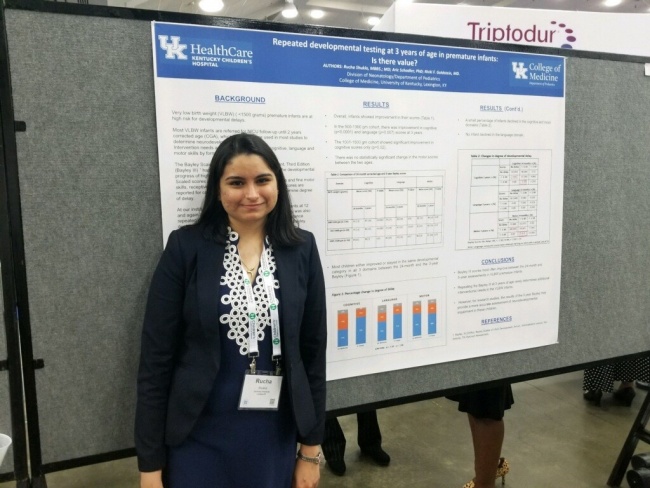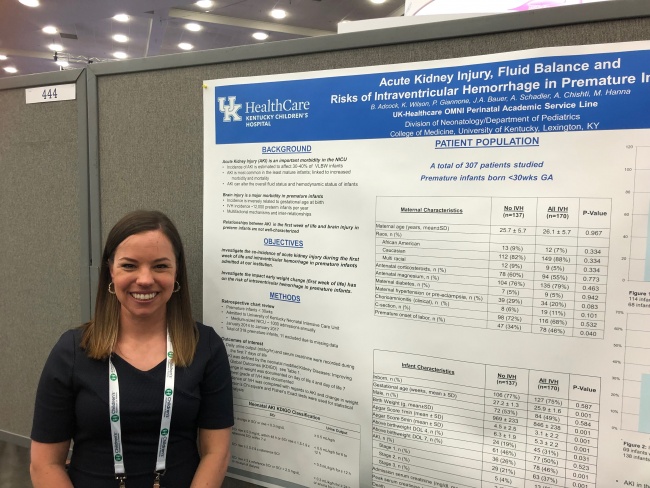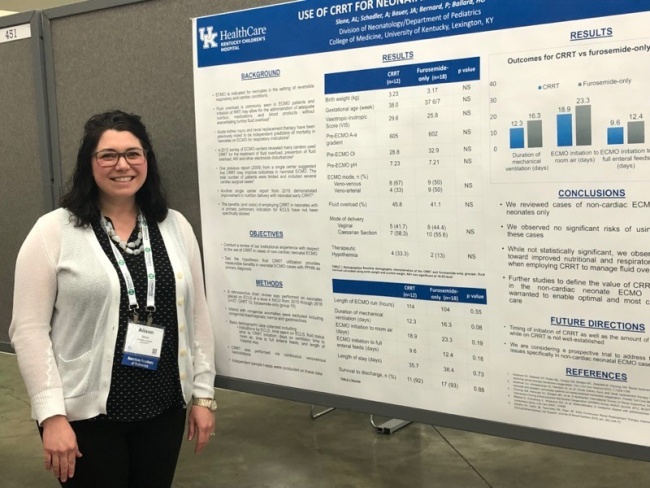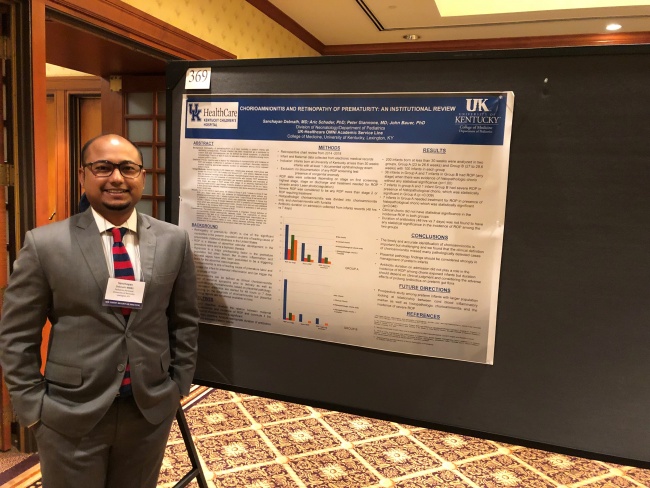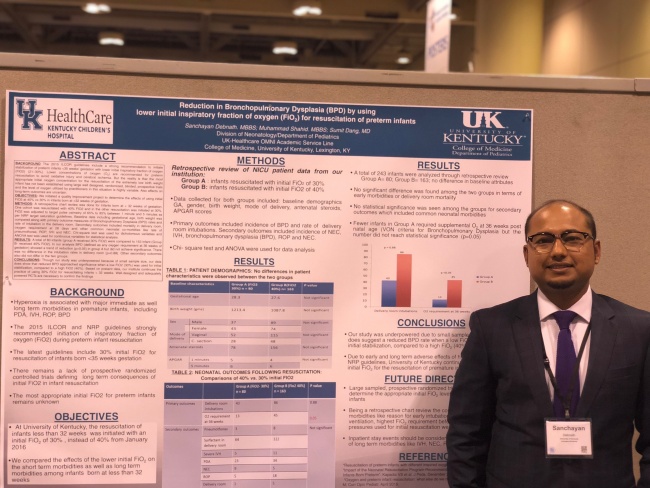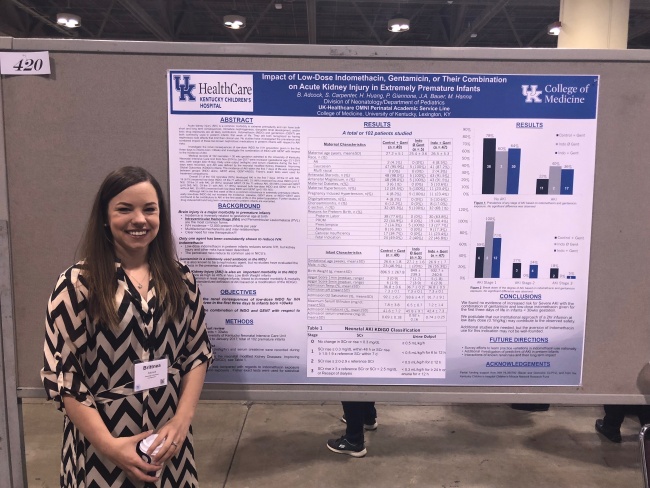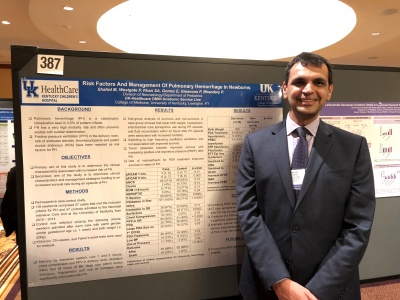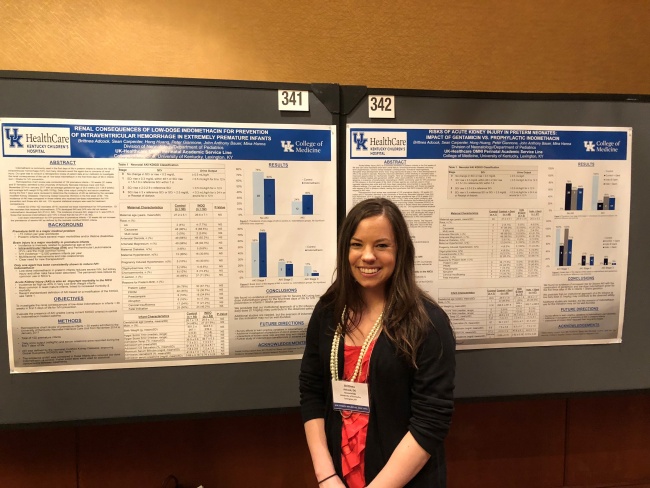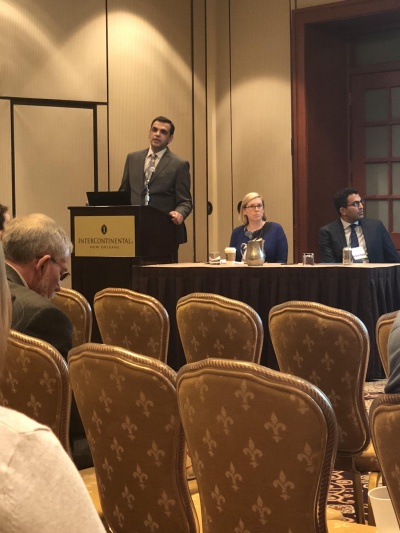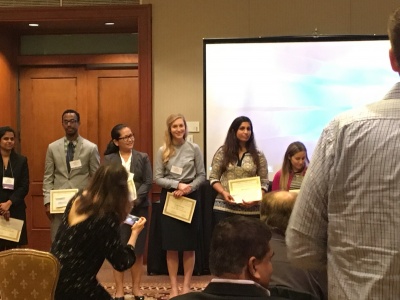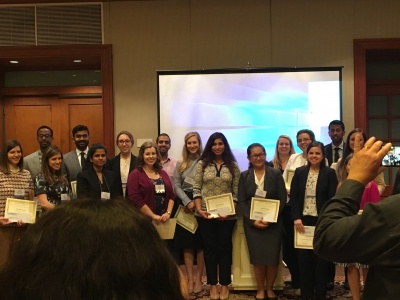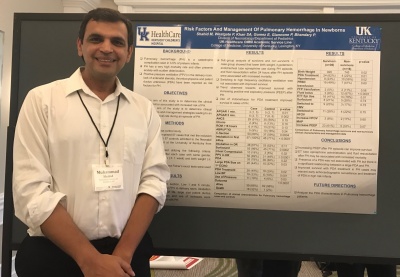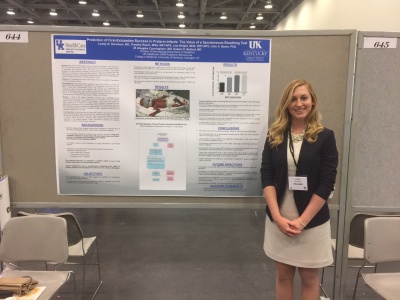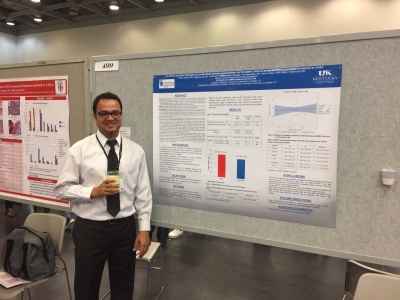Research Curriculum
Some Important Issues for Successful Research Progress
Expectations for the Trainee
Research success for a fellow is strongly related to the interest and effort invested. Consistent communication with mentors and program directors, consistent intellectual interest and effort are critical, as are timeliness (e.g. meeting deadlines and targets) and cooperation with others. The trainee is strongly encouraged to develop their interests, and define a project and Scholarly Oversight Committee (SOC) as early in the training as possible. Attendance of required research meetings, assisting other research trainees where appropriate and diligently working toward project progress are all expectations of the trainee.
Expectations for the Trainee
Research success for a fellow is strongly related to the interest and effort invested. Consistent communication with mentors and program directors, consistent intellectual interest and effort are critical, as are timeliness (e.g. meeting deadlines and targets) and cooperation with others. The trainee is strongly encouraged to develop their interests, and define a project and Scholarly Oversight Committee (SOC) as early in the training as possible. Attendance of required research meetings, assisting other research trainees where appropriate and diligently working toward project progress are all expectations of the trainee.
Choosing a Research Advisor
Working with a faculty mentor on a research project can create a life-long relationship and should be a beneficial experience to all parties. Fellows are encouraged to seek out and interact with divisional faculty early in their fellowship to find a ‘good fit’ in identifying a research project advisor. Reviewing posted faculty interests, reading past manuscripts and other publications, group discussions, and specific research discussions are all encouraged. Fellows are required to meet with each individual faculty member to discuss research interests and professional goals in the first three months of their fellowship period, with a goal of identifying an advisor (or advisors) as soon as possible.
The expectations of the research advisor include the following: The advisor is expected to take an active role in guiding the fellows research activities and assist in minimizing barriers for project progress. The advisor is responsible for the fellow meeting expectations with regard to research progress and learning opportunities. The advisor should use the SOC committee, the fellowship program directors, and the fellowship program manager as participants to the fellows research training experience.
Choosing a Research Advisor
Working with a faculty mentor on a research project can create a life-long relationship and should be a beneficial experience to all parties. Fellows are encouraged to seek out and interact with divisional faculty early in their fellowship to find a ‘good fit’ in identifying a research project advisor. Reviewing posted faculty interests, reading past manuscripts and other publications, group discussions, and specific research discussions are all encouraged. Fellows are required to meet with each individual faculty member to discuss research interests and professional goals in the first three months of their fellowship period, with a goal of identifying an advisor (or advisors) as soon as possible.
The expectations of the research advisor include the following: The advisor is expected to take an active role in guiding the fellows research activities and assist in minimizing barriers for project progress. The advisor is responsible for the fellow meeting expectations with regard to research progress and learning opportunities. The advisor should use the SOC committee, the fellowship program directors, and the fellowship program manager as participants to the fellows research training experience.
Choosing a Scholarship Oversight Committee
The fellow and primary advisor should develop a SOC as soon as possible, preferably within the first six months. SOC members have the primary role of providing research-related guidance, specific expertise, and/or other element that can enhance the fellow’s research experience. The SOC also serves as an oversight group to assure the advisor that the fellow is progressing in accordance with program expectations. SOC members are to be reported to the program coordinator. The composition of the SOC must include two members of current neonatology faculty and one faculty outside of the division. The SOC committee members will be suggested by the Fellowship Research Steering Committee.
Choosing a Scholarship Oversight Committee
The fellow and primary advisor should develop a SOC as soon as possible, preferably within the first six months. SOC members have the primary role of providing research-related guidance, specific expertise, and/or other element that can enhance the fellow’s research experience. The SOC also serves as an oversight group to assure the advisor that the fellow is progressing in accordance with program expectations. SOC members are to be reported to the program coordinator. The composition of the SOC must include two members of current neonatology faculty and one faculty outside of the division. The SOC committee members will be suggested by the Fellowship Research Steering Committee.
Research Progress Monitoring
The fellow is expected to present their research progress at frequent intervals throughout their training. The goals of these interactions are to provide feedback to the fellow and assist in minimizing barriers for project progress. SOC meetings are required every six-to-eight months during fellowship, wherein the progress of the fellow will be reviewed and discussed. The program coordinator will schedule these meetings for you and must be present at each meeting. Each fellow will also be expected to present their research project to the division twice per year, starting in mid-PGY4.
Research Progress Monitoring
The fellow is expected to present their research progress at frequent intervals throughout their training. The goals of these interactions are to provide feedback to the fellow and assist in minimizing barriers for project progress. SOC meetings are required every six-to-eight months during fellowship, wherein the progress of the fellow will be reviewed and discussed. The program coordinator will schedule these meetings for you and must be present at each meeting. Each fellow will also be expected to present their research project to the division twice per year, starting in mid-PGY4.
Primary vs. Secondary Research Projects
The research goals for a fellow are to have a positive and progressive experience in conducting a research project that 1) fulfills the expectations of the ACGME and ABP and 2) can prepare the fellow for their own career progression. Optimal research projects are ones that provide learning opportunities for the full path of research project development from concept development through IRB, methods usage, data collection, analysis, interpretation, and publication. The fellow should have a primary project and mentorship support that provides these learning experiences. Secondary projects (e.g., side-activities of research that may be available via other faculty, etc.) are not encouraged since they can distract the momentum and progress of the fellow in their primary project. In some cases a secondary project that is similar or overlapping to the main project may be acceptable for fellow involvement; these require agreement with the primary advisor, SOC, and program directors. Fellows are required to get approval of any additional research activities prior to any secondary project involvement.
Primary vs. Secondary Research Projects
The research goals for a fellow are to have a positive and progressive experience in conducting a research project that 1) fulfills the expectations of the ACGME and ABP and 2) can prepare the fellow for their own career progression. Optimal research projects are ones that provide learning opportunities for the full path of research project development from concept development through IRB, methods usage, data collection, analysis, interpretation, and publication. The fellow should have a primary project and mentorship support that provides these learning experiences. Secondary projects (e.g., side-activities of research that may be available via other faculty, etc.) are not encouraged since they can distract the momentum and progress of the fellow in their primary project. In some cases a secondary project that is similar or overlapping to the main project may be acceptable for fellow involvement; these require agreement with the primary advisor, SOC, and program directors. Fellows are required to get approval of any additional research activities prior to any secondary project involvement.
Fellow Travel to Present Their Research
The division is highly supportive of fellows traveling to present their research at conferences and limited funds are available to support such activities. The goal of this financial support is to provide exposure of our fellows to research communities, gain experience presenting their own research ideas and findings, and enhance visibility for our fellowship program. In general travel support can be provided to fellows for two meetings per year with preference given to national meetings (e.g., Society for Pediatric Research annual meeting or equivalent); regional meetings with pediatrics or neonatology emphasis can also be considered (on a specific request basis). Fellows are encouraged to discuss travel support possibilities prior to abstract submission with their primary advisor and the fellowship program directors. Divisional financial support for fellow travel is reserved to fellows with first author status and/or those presenting the work at the conference.
Shown below is a list of relevant settings for Fellows to present their work; several conferences offer a travel scholarship. With good planning, all fellows should be able to attend one or more of these to present their work. Priority should be given to national meetings relevant to pediatrics.
The conferences are:
February: SSPR New Orleans. (Sponsored by the fellowship program with accepted abstract. Can also obtain travel award)
April/May: PAS. (Sponsored by the fellowship program with accepted abstract. Can also obtain travel award)
April: Workshop on Perinatal Practice Strategies Arizona. (Sponsored by AAP)
May: SAN conference Florida. (Sponsored by the AAP, many fellows can apply, multiple times)
June: Annual Trainees Seminar on Neonatal‐Perinatal Medicine Santa Fe. (Sponsored by AAP, only first years)
June: AAP/MJN Perinatal & Developmental Symposium Aspen. One third year fellow per year, only one time. Sponsored by MJN with accepted abstract
September: VON Annual Quality Congress Chicago. (Sponsored by VON with accepted abstract)
September: Central Conference on Perinatal Research. Sponsored by MJN with accepted abstract
October: AAP National Conference and Exhibition. (Sponsored by the AAP. Better with abstract)
November: AAP/MJN Perinatal & Developmental Symposium Florida. One second or third year fellow per year, only one time. Sponsored by MJN with accepted abstract
Fellow Travel to Present Their Research
The division is highly supportive of fellows traveling to present their research at conferences and limited funds are available to support such activities. The goal of this financial support is to provide exposure of our fellows to research communities, gain experience presenting their own research ideas and findings, and enhance visibility for our fellowship program. In general travel support can be provided to fellows for two meetings per year with preference given to national meetings (e.g., Society for Pediatric Research annual meeting or equivalent); regional meetings with pediatrics or neonatology emphasis can also be considered (on a specific request basis). Fellows are encouraged to discuss travel support possibilities prior to abstract submission with their primary advisor and the fellowship program directors. Divisional financial support for fellow travel is reserved to fellows with first author status and/or those presenting the work at the conference.
Shown below is a list of relevant settings for Fellows to present their work; several conferences offer a travel scholarship. With good planning, all fellows should be able to attend one or more of these to present their work. Priority should be given to national meetings relevant to pediatrics.
The conferences are:
February: SSPR New Orleans. (Sponsored by the fellowship program with accepted abstract. Can also obtain travel award)
April/May: PAS. (Sponsored by the fellowship program with accepted abstract. Can also obtain travel award)
April: Workshop on Perinatal Practice Strategies Arizona. (Sponsored by AAP)
May: SAN conference Florida. (Sponsored by the AAP, many fellows can apply, multiple times)
June: Annual Trainees Seminar on Neonatal‐Perinatal Medicine Santa Fe. (Sponsored by AAP, only first years)
June: AAP/MJN Perinatal & Developmental Symposium Aspen. One third year fellow per year, only one time. Sponsored by MJN with accepted abstract
September: VON Annual Quality Congress Chicago. (Sponsored by VON with accepted abstract)
September: Central Conference on Perinatal Research. Sponsored by MJN with accepted abstract
October: AAP National Conference and Exhibition. (Sponsored by the AAP. Better with abstract)
November: AAP/MJN Perinatal & Developmental Symposium Florida. One second or third year fellow per year, only one time. Sponsored by MJN with accepted abstract
Anticipated Timeline for Research Progress
An important goal is for the new fellow to engage in research activities and thinking as early as possible during training. Fellows typically start the program in July; prior to arrival it is helpful if the Fellow has some research experiences and perhaps some idea of specific research areas of interest. Interactions with faculty and staff and discussions with others regarding research topics are strongly encouraged as early as possible.
Shown below is a sequence of goals and milestones for successful progression of Fellow research activities and abilities.
PGY– 4, Quarter 1 (July – Sept)
Benchmark 1: The fellow learns the general academic/clinical environment, the people, and the processes already in place.
- Official start of fellow occurs ~July 1st.
- Fellow arrives, attends program orientation.
- Fellow starts clinical orientation and involvement (see separate description).
Benchmark 2: The fellow completes requisite training and certification for clinical/translational research activities and laboratory safety and animal handling (if appropriate).
- Fellow gets CITI trained via online training.
- Other training for research activities is completed (lab safety, animal use, and others as relevant to project needs)
Benchmark 3: The fellow learns about available research project possibilities.
- Fellow meets with individual faculty (required) and develops specific research interests.
- Fellow attends research discussion groups and presentations, meets with program directors for input and guidance. A list of ‘research interest keywords’ is developed.
- Fellow develops an understanding of institutional research infrastructure available (CCTS, other).
PGY– 4, Quarter 1 (July – Sept)
Benchmark 1: The fellow learns the general academic/clinical environment, the people, and the processes already in place.
- Official start of fellow occurs ~July 1st.
- Fellow arrives, attends program orientation.
- Fellow starts clinical orientation and involvement (see separate description).
Benchmark 2: The fellow completes requisite training and certification for clinical/translational research activities and laboratory safety and animal handling (if appropriate).
- Fellow gets CITI trained via online training.
- Other training for research activities is completed (lab safety, animal use, and others as relevant to project needs)
Benchmark 3: The fellow learns about available research project possibilities.
- Fellow meets with individual faculty (required) and develops specific research interests.
- Fellow attends research discussion groups and presentations, meets with program directors for input and guidance. A list of ‘research interest keywords’ is developed.
- Fellow develops an understanding of institutional research infrastructure available (CCTS, other).
PGY– 4, Quarter 2 (October – December)
Benchmark 4: The fellow successfully passes the Pediatrics Board Exam (taken in October).
Note: Consistent preparations for this very important exam throughout the first quarter, while also engaging in clinical experience and research planning, is strongly encouraged! Effective time management is an important aspect of the initial months of fellowship.
Benchmark 5: Initial development and planning of a research project.
- Fellow develops a research interest keywords and project plans in alignment and with guidance from faculty member(s) and program directors.
- Fellow develops skill in using PUBmed and related research databases. Keywords of interest are used to review relevant current literature.
- Refinement of research plan and where possible involvement in ongoing research activities.
- Potential project support and assistance for senior fellows if appropriate.
PGY– 4, Quarter 2 (October – December)
Benchmark 4: The fellow successfully passes the Pediatrics Board Exam (taken in October).
Note: Consistent preparations for this very important exam throughout the first quarter, while also engaging in clinical experience and research planning, is strongly encouraged! Effective time management is an important aspect of the initial months of fellowship.
Benchmark 5: Initial development and planning of a research project.
- Fellow develops a research interest keywords and project plans in alignment and with guidance from faculty member(s) and program directors.
- Fellow develops skill in using PUBmed and related research databases. Keywords of interest are used to review relevant current literature.
- Refinement of research plan and where possible involvement in ongoing research activities.
- Potential project support and assistance for senior fellows if appropriate.
PGY– 4, Quarter 3 (January – March)
Benchmark 6: The fellow’s research project, research mentor(s), and faculty advisory team established.
- Fellow has a research project defined and a primary (and in some cases secondary) mentor established.
- Fellow and mentor meet with the Fellowship Research Steering Committee for approval before SOC is composed.
- The Fellowship Steering Committee, based on the project outline/interest, will assign a Scholarship Oversight Committee with the fellow and their mentor.
- Where appropriate, IRB or other relevant paperwork submitted for project initiation.
- Fellow presents the planned project to the division.
All Fellows are expected to have a research project, primary mentor, and SOC in place by the end of the third quarter. Actual launch of the research project in this time period is desirable to provide adequate time for research progress.
PGY– 4, Quarter 3 (January – March)
Benchmark 6: The fellow’s research project, research mentor(s), and faculty advisory team established.
- Fellow has a research project defined and a primary (and in some cases secondary) mentor established.
- Fellow and mentor meet with the Fellowship Research Steering Committee for approval before SOC is composed.
- The Fellowship Steering Committee, based on the project outline/interest, will assign a Scholarship Oversight Committee with the fellow and their mentor.
- Where appropriate, IRB or other relevant paperwork submitted for project initiation.
- Fellow presents the planned project to the division.
All Fellows are expected to have a research project, primary mentor, and SOC in place by the end of the third quarter. Actual launch of the research project in this time period is desirable to provide adequate time for research progress.
PGY– 4, Quarter 4 (April – June)
Benchmark 7: The research project is refined and established
- Fellow has established background knowledge in research project area
- Fellow research project underway
- SOC is aware of and engaged in project oversight
- The research plan is presented to divisional faculty
PGY– 4, Quarter 4 (April – June)
Benchmark 7: The research project is refined and established
- Fellow has established background knowledge in research project area
- Fellow research project underway
- SOC is aware of and engaged in project oversight
- The research plan is presented to divisional faculty
PGY– 5, Quarters 5 – 6 (July – December)
Benchmark 8: The fellow’s research project is enacted and progressing
- IRB is approved, study is ongoing, data is being collected
- Research support staff are involved in project progress as appropriate
- Frequent involvement of research mentor(s) and SOC for project guidance is provided
- Fellowship directors and coordinator monitor progress
PGY– 5, Quarters 5 – 6 (July – December)
Benchmark 8: The fellow’s research project is enacted and progressing
- IRB is approved, study is ongoing, data is being collected
- Research support staff are involved in project progress as appropriate
- Frequent involvement of research mentor(s) and SOC for project guidance is provided
- Fellowship directors and coordinator monitor progress
PGY– 5, Quarter 7 – 8 (January – June)
Benchmark 9: Research project is progressing and work products are planned and/or under development
- IRB is approved, study is ongoing, and data is being collected (if appropriate).
- Animal use training is approved if relevant.
- A plan for presentations at meetings and manuscript writing and submission is underway.
- Where appropriate fellow has an opportunity to present some research findings at a scientific conference(s). See below for policies regarding travel and meeting opportunities.
PGY– 5, Quarter 7 – 8 (January – June)
Benchmark 9: Research project is progressing and work products are planned and/or under development
- IRB is approved, study is ongoing, and data is being collected (if appropriate).
- Animal use training is approved if relevant.
- A plan for presentations at meetings and manuscript writing and submission is underway.
- Where appropriate fellow has an opportunity to present some research findings at a scientific conference(s). See below for policies regarding travel and meeting opportunities.
PGY– 6, Quarter 9 – 10 (July – December)
Benchmark 9 (continued): Research project is progressing and nearing completion
- Research project is underway, data is being collected.
- Some data analyses are ongoing.
- If appropriate the fellow has an opportunity to present some research findings at a scientific conference(s). See below for policies regarding travel and meeting opportunities.
- Research progress presented to faculty
PGY– 6, Quarter 9 – 10 (July – December)
Benchmark 9 (continued): Research project is progressing and nearing completion
- Research project is underway, data is being collected.
- Some data analyses are ongoing.
- If appropriate the fellow has an opportunity to present some research findings at a scientific conference(s). See below for policies regarding travel and meeting opportunities.
- Research progress presented to faculty
PGY– 6, Quarter 11 – 12 (January – June)
Benchmark 10: Research project is completed and work product(s) are developed and submitted
- Fellow has an opportunity to present some research findings at a scientific conference(s). See below for policies regarding travel and meeting opportunities.
- Fellow is actively seeking career opportunities for post-fellowship.
- Fellow is actively finalizing data analysis and drafting manuscript with primary mentor and SOC.
- Final meeting with SOC with final draft and ABP Scholarly Activities Cover page signed for ABP submission.
- Final draft of manuscript complete with intention of submission to a peer-reviewed journal per requirements by the American Board of Pediatrics (ABP). (Due mid-June)
PGY– 6, Quarter 11 – 12 (January – June)
Benchmark 10: Research project is completed and work product(s) are developed and submitted
- Fellow has an opportunity to present some research findings at a scientific conference(s). See below for policies regarding travel and meeting opportunities.
- Fellow is actively seeking career opportunities for post-fellowship.
- Fellow is actively finalizing data analysis and drafting manuscript with primary mentor and SOC.
- Final meeting with SOC with final draft and ABP Scholarly Activities Cover page signed for ABP submission.
- Final draft of manuscript complete with intention of submission to a peer-reviewed journal per requirements by the American Board of Pediatrics (ABP). (Due mid-June)

